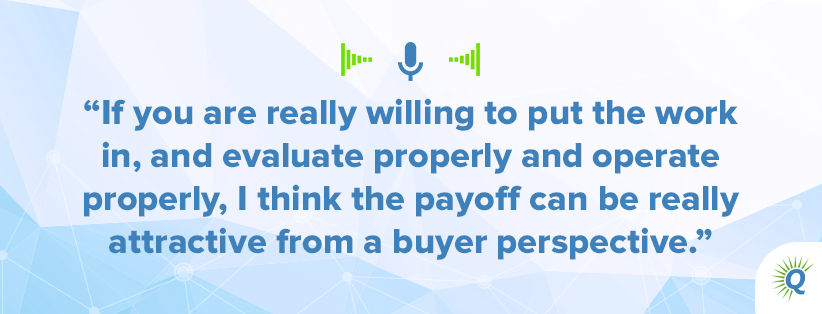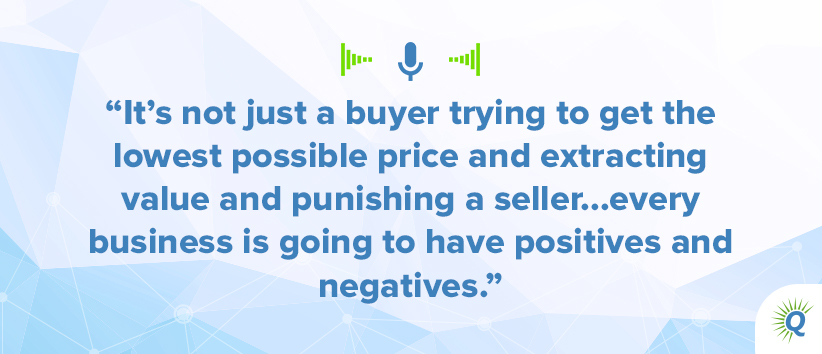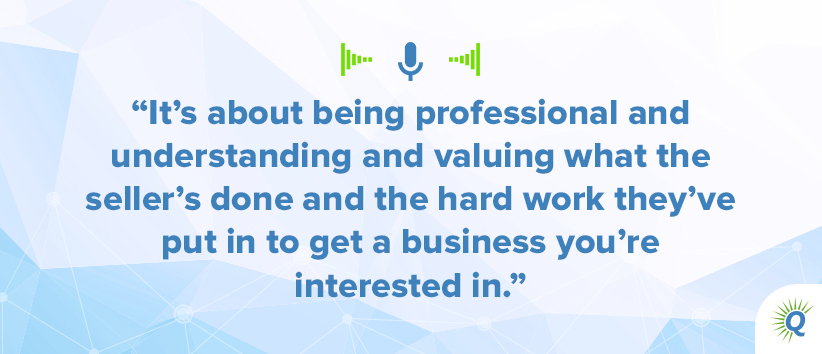Topics:
Never Miss a Beat - Get Updates Direct to Your Inbox
FILTER:


In a Seller’s Market, Here’s How to Stand Out as a Buyer
By Quiet Light
At this moment in time, when a profitable business showing signs of strong growth lands on the market, a buyer will likely have to get in line behind a slew of others.
One reason it’s a seller’s market right now? It’s a good time to be in business.
Confidence among small business owners, which shows up as plans to increase inventory or hire additional staff and increased capital spending, reached a record 45-year high in August of this year.
Lower taxes and lighter regulations helped contribute to that confidence for sure.
Meanwhile, for many entrepreneurs, the call of autonomy and scalability gets louder every day.
Once you decide to answer that call, though, you’ll find that things move quickly and it’s extremely crowded.
How do you stand a chance?
What makes some buyers emerge as contenders and others fade into the background with the spectators?
Ben Carpel – entrepreneur, veteran of the institutional investment world, and revered client of Quiet Light on the buyers’ side – shared some great advice on the podcast this week.


Listen to the Source of this Post:
This blog post is based on a podcast episode that we recently recorded. Listen to the full episode here:Ben spent his early years sourcing, negotiating, structuring, and evaluating deals for others in the investment world, before becoming a buyer/investor himself.
After working with Ben several times, Joe Valley has come to think of him as something of a role model for buyers.
Ultimately, being skilled at operating a business won’t necessarily make you skilled at navigating the negotiations of a successful deal. Preparation is key.
For anyone interested in the art of an acquisition and ready to cement your reputation as a serious buyer to be reckoned with, let’s look at 5 things you’ll need to do according to Ben.
Be Willing to Take the High Road
Be Ready to Manage Expectations
Be Willing to Take the High Road
If you’ve seen The Godfather, you know the Corleones are the kind of business people who get what they want by whatever means necessary.
Considering how many of their friends and acquaintances end up dead, it’s not an advisable strategy.
There may be one aspect of that family business, though, that’s actually a good lesson here…
The Corleones are playing the long game.
When the Don laments to his successor Michael at one point, “There wasn’t enough time.”
Michael responds, “We’ll get there, Pop. We’ll get there.”
And by the end of the movie, you believe him.


In acquisitions, as with crime-family empires, the long game is the game you want to win.
According to Ben, that win-by-whatever-means approach won’t actually win much in the long run, though.
Especially when sellers have so many buyers courting them.
Ben’s advice for handling the up-and-down roller coaster of negotiations once you get into a deal?
Drop the aggressive strategy; it’s counterproductive. Keep a level head and don’t overreact. Do the right thing, even when it’s the hard thing.
Ben has had great success buying businesses by understanding the give and take aspect of a profitable acquisition.
One of the important qualities he suggests bringing to the table?
Honor.
As in… stick to your word and stay on the high road and off the overly-aggressive road where you try to extract every penny out of the seller.


For example, Ben describes a situation with an investor where he could have lined up additional investors in case the original one fell through.
He recommends it as a best practice, but he’d given his word that he wouldn’t take the deal to anyone else.
When the original investor backed out, Ben was left scrambling to find a replacement at the final hour.
Keeping his word in that case caused stress and headaches. Still, he kept his honor intact and put his long-term reputation ahead of short-term just-get-it-done thinking.
Once you build a reputation for doing what you say you’ll do, that reputation will stay in the mind of all parties involved.


Which matters when opportunities come up down the road.
Furthermore, having a code of conduct in place, knowing you’ll do the honorable thing, can provide stability; like a rudder, it can help you steer through rough waters and stay the course.
When the chaos of the moment hits and emotions run high or urgency takes over, that code can keep you from making short-sighted decisions that you’ll inevitably have to pay for later.
Be Ready to Manage Expectations
In any acquisition, the seller brings one set of advisors and stakeholders to the table, and the buyer brings another set.
The result? A lot of different interests waiting and demanding to be met.
Ben points out that as a buyer you’re tasked with managing the expectations of investors, banks, brokers, and sellers all at once.
That’s a delicate task that many buyers underestimate.
Having investors involved in the conversation from the beginning can help, as well as avoiding promises that you aren’t absolutely certain you can keep.
Stay realistic. Negotiating the details and finalizing a purchase takes time.
It’s a process, and delays are inevitable.
And where an SBA loan is involved, it can get complicated.


When setbacks occur, if you’ve given all parties the clearest most accurate picture possible along the way, it’s much easier to bounce back.
Being clear and realistic with the seller from the beginning builds trust in you and confidence in your abilities.
Imagine that rather than building a successful deal, you’re building a house…
And don’t be the builder who leaves the homeowners sitting with their furniture on the lawn in front of an unfinished house on moving day.
Trust mitigates risk, so when you can prove you’re worthy of it, you effectively raise your value as a buyer in the acquisition world.
Expectations are a funny thing, born of romantic stories of high-dollar exits and wild headlines.
So part of managing them is introducing reality, gently.
Andrew Marder, an early team member at Capterra before it was acquired by Gartner, described that gap between the buy-out dream and the reality.
Reflecting on the experience a couple years post-sale, he wrote that movies and popular acquisition stories focus on glorifying a single founder, while “in real life, there’s a lot of infrastructure and humanity left behind after a sale.”
It’s a good reminder that expectations aren’t always in line with reality, and as a buyer your own humanity matters.


Be Kind
The power of kindness may be underrated in this volatile world, but the science supports it.
According to Ben, kindness can be a powerful advantage in a competitive situation where a seller has multiple offers.
According to science, an act of kindness focuses our brains on something positive, and our brains in that state are a whopping 33% more effective than in a negative, neutral, or stressed state.
Kindness is powerful. It actually makes us smarter and a good deal more effective.
When you create a positive environment through even a simple act of kindness, you’re more likely to succeed.
Sellers are human beings in an emotionally charged situation. A major part of your job as a buyer is to sell yourself to the seller as the right buyer, just as you’ll need to sell yourself to any investors you bring on board as a worthy investment.
Aside from evaluating the business itself, it’s probably your biggest job.
Joe’s story of meeting a potential buyer and deciding within minutes on the call that he’d never sell to the guy at any price is a story many sellers have to tell.
As Joe says, “Don’t be that guy.”


Put yourself in the seller’s shoes. Expressing appreciation, showing respect, acting with kindness, these factors influence a seller’s judgement of whether or not to do business with you more than dollars and multiples.
Never underestimate the power of a sincere compliment after all the work a seller has put in.
Inexperienced buyers are sometimes afraid that kindness equates to weakness when that couldn’t be farther from the truth.
Be Willing to Communicate
A big part of being professional lies in the way you communicate.
A lack of communication that leaves the other parties wondering and guessing what’s going on just leads to insecurity and confusion.
Even when the information you have to communicate isn’t positive, you can handle it in a positive way.
Not by putting a spin on it, but by being forthcoming and straightforward.
Ben advises that you communicate consistently and often as the deal progresses.
He’s gone so far as to provide daily updates to brokers and sellers in one case when his side of the deal hit a snag.
A tendency to avoid bad news, while natural, will ultimately work against you.
Remember that building trust is a major part of your job.


One of the skills Ben brings to the table, I suspect, from his experience in the investment world is confidence in his role.
And that can be critical, because when you communicate with confidence, you build trust.
Thorough due diligence should also go a long way toward helping you communicate effectively.
Because, when you know exactly what you want to accomplish, you’re much better able to communicate that clearly and effectively.
Be Adaptable
One of the rules of acquisition seems to be that anything can happen.
There are as many ways for a deal to fall apart, perhaps, as there are deals.
One thing I took away from Ben’s conversation this week is the importance of the ability to pivot when things aren’t going well.


When the tax consequences in one case turned out to be greater than expected for a seller, he was willing to restructure the deal to alleviate some of the tax burden.
Generally speaking, a deal structure that’s favorable to the buyer from a tax perspective won’t be favorable to the seller’s tax situation.
But Ben points out that a short-term loss can be less important than an overall successful outcome.
Again, knowing exactly what you want to accomplish, but being adaptable on your way to getting there can make all the difference.
Listening to him talk, it’s apparent that when it comes to stress – he doesn’t avoid it, he expects it and then manages it.
It’s not rigidity that stands out in Ben’s approach, but flexibility.
Over $10MM in acquisitions later, there’s a lesson in it that approach we could probably all learn from.
A successful acquisition is an art, that much is clear.
Overall if you’re looking to find success as a buyer, it’s probably better if you don’t treat the process like some Sicilian vendetta.
Be more Ben Carpel and less Sonny Corleone.
Be prepared. Be kind. Be straight up with everyone involved.
Have confidence in yourself. Expect stress, but keep a level head.
Do all that, and as the Don would say, you have my blessing.





